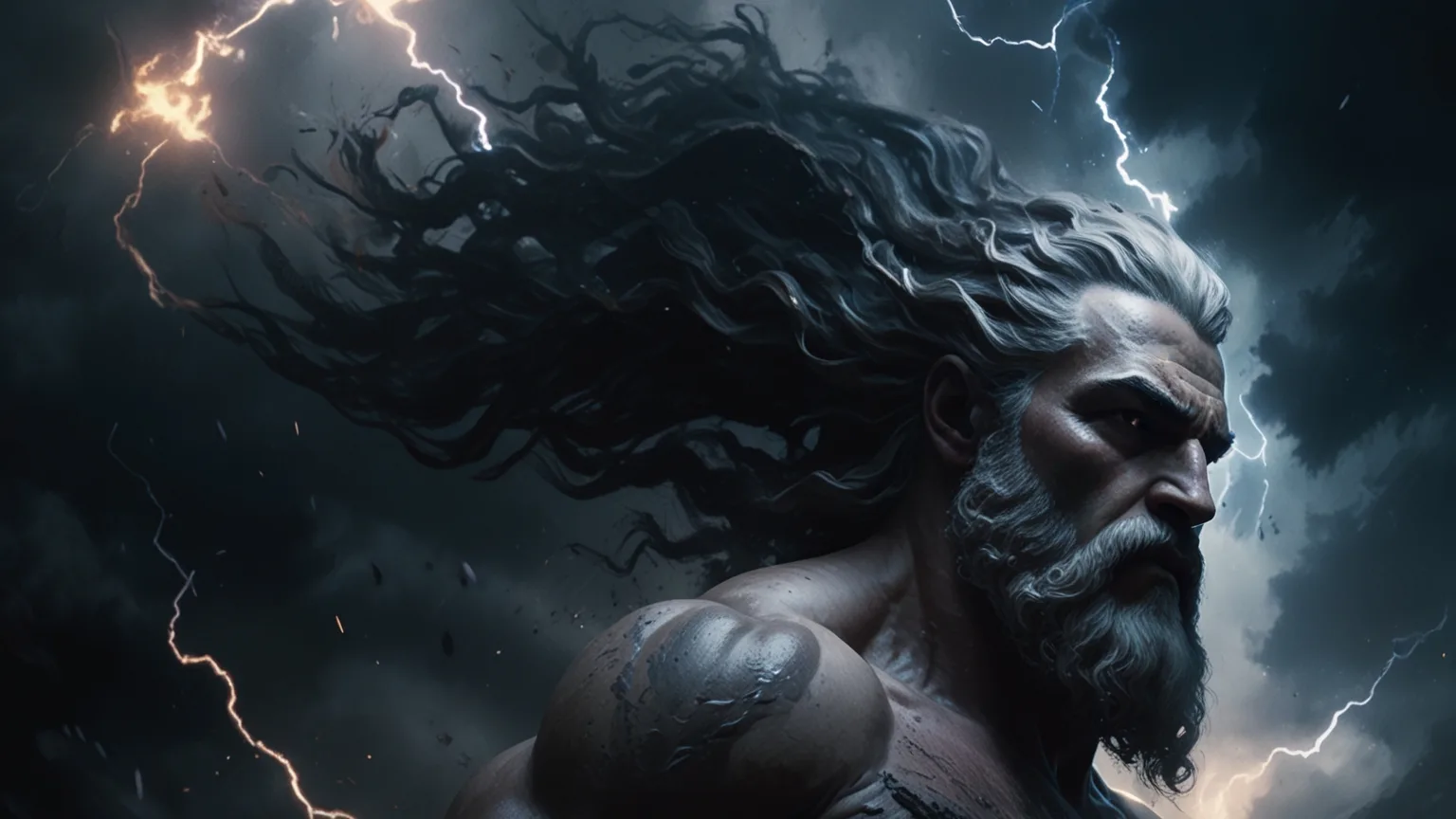Zeus, known as the King of the Gods in Greek mythology, is one of the most iconic and powerful deities in ancient religion and culture. His influence spans across myths, temples, and ancient texts that shaped the beliefs and values of ancient Greece. Zeus was the ruler of Mount Olympus, the god of the sky and thunder, and a central figure in Greek cosmology. But Zeus is not merely a static god of justice and power; his character is dynamic, full of paradoxes, and deeply intertwined with the myths and stories that define his legacy.
The Origins of Zeus
Born Amidst Chaos: The Rise of the Olympian King
Zeus was born to Cronus and Rhea, two of the Titans, the primordial deities who ruled before the Olympians. Cronus, fearing that one of his children would overthrow him as he had overthrown his father Uranus, devoured each of his offspring at birth. However, when Zeus was born, Rhea tricked Cronus by giving him a stone wrapped in swaddling clothes to swallow instead.
Rhea hid the infant Zeus in a cave on the island of Crete, where he was nurtured by the nymph Amalthea and protected by the Kouretes, who clashed their shields to mask his cries. When Zeus grew strong enough, he confronted Cronus, forced him to disgorge his siblings, and waged a war known as the Titanomachy. Zeus and his allies—the other Olympians, Cyclopes, and Hecatoncheires—defeated the Titans, casting them into Tartarus and solidifying his place as the supreme ruler of the cosmos.
Zeus’s Attributes and Symbols
Zeus is often depicted with a regal and commanding presence. His symbols reflect his authority and power:
- The Thunderbolt: Forged by the Cyclopes, the thunderbolt became Zeus’s primary weapon, signifying his control over the heavens and his ability to smite his enemies.
- The Eagle: A symbol of strength and vigilance, the eagle is closely associated with Zeus.
- The Oak Tree: Sacred to Zeus, the oak embodies stability and wisdom.
- The Throne of Olympus: As the king of the gods, Zeus’s throne represents his rule over both mortals and deities.
The Many Faces of Zeus
The Protector and Punisher
Zeus is often portrayed as a just ruler who protects the moral order, known as dike. In myth, he punishes hubris and ensures that oaths are honored. For instance, he punished Prometheus for stealing fire and giving it to humanity, chaining him to a rock where an eagle would devour his liver daily. However, Zeus also shows mercy and can be persuaded to forgive, as seen when he eventually freed Prometheus.
The Lover and Seducer
Zeus’s numerous love affairs—both consensual and coercive—are infamous in mythology. He fathered many gods, demigods, and heroes, often taking on various forms to seduce mortals and deities alike:
- Leda and the Swan: Zeus transformed into a swan to seduce or assault Leda, resulting in the birth of Helen of Troy and the Dioscuri.
- Europa and the Bull: Disguised as a bull, Zeus abducted Europa, taking her to Crete and fathering Minos, Rhadamanthys, and Sarpedon.
- Danaë and the Golden Shower: To impregnate Danaë, who had been locked away, Zeus transformed into a shower of gold, fathering Perseus.
These myths highlight Zeus’s duality as a creator and disruptor, embodying both generative and destructive forces.
Zeus in Mythology
The Gigantomachy: Defending the Cosmos
Following the Titanomachy, Zeus faced the Gigantes, a race of giants born from the blood of Uranus. This epic battle, known as the Gigantomachy, saw Zeus leading the Olympians to protect the world from chaos and destruction. The thunderbolt was instrumental in securing victory, further cementing Zeus’s role as a cosmic defender.
The Judgment of Paris
Zeus’s involvement in mortal affairs is exemplified in the myth of the Judgment of Paris. To settle a dispute among Hera, Athena, and Aphrodite, Zeus delegated the decision to Paris of Troy, setting in motion the events that would lead to the Trojan War. While he remained neutral, his actions underscored his intricate role in shaping human destiny.
Zeus and Prometheus: A Complex Relationship
Zeus’s relationship with Prometheus highlights his multifaceted nature. While Zeus initially punished Prometheus for defying him, their interactions also reveal a begrudging respect. In some versions of the myth, Zeus allows Prometheus to play a role in teaching humanity valuable lessons about survival and resilience.
Zeus’s Legacy and Worship
Zeus was worshipped across ancient Greece, with grand temples and festivals dedicated to him:
- The Temple of Zeus at Olympia: This monumental structure housed the chryselephantine statue of Zeus, one of the Seven Wonders of the Ancient World.
- The Olympic Games: Held in Zeus’s honor, these games celebrated physical prowess and unity among Greek city-states.
- Dodona: The oracle of Zeus at Dodona, where priests interpreted the rustling of oak leaves as divine messages, reflects his role as a god of prophecy.
Interpretations of Zeus
Zeus’s mythology has been interpreted in various ways throughout history. To the ancient Greeks, he represented the idealized king—wise, just, and powerful. In modern times, scholars view Zeus as a symbol of the natural forces and societal structures that govern human existence. His myths continue to inspire literature, art, and philosophy, making him a timeless figure in the collective consciousness.
Controversies Surrounding Zeus
Zeus’s actions, particularly his numerous affairs and acts of coercion, have sparked debates about his moral character. While ancient cultures may have viewed these stories as reflections of divine prerogative, modern interpretations often critique them through the lens of ethics and power dynamics.
Epilogue
Zeus, the King of Olympus, remains one of the most compelling figures in mythology. His story is one of triumph, complexity, and contradiction, embodying both the highest ideals and the deepest flaws of the human and divine experience. As the god of thunder and justice, Zeus’s legacy continues to echo through the ages, reminding us of the enduring power of myth to shape our understanding of the world.



